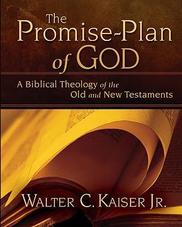 Kaiser continues to promote the Promise Plan of God as the constant theme of scripture throughout the prophetic books. While few words or phrases consistently characterize the promise theme throughout all the prophets as was the case in earlier Old Testament works, Kaiser reveals how the “both/and” nature of prophecy actually integrates with God's promise-plan of redemption. For prophecy was not so much prediction as it was embracing “...the historical means employed for keeping that purpose [promise] alive over the centuries while it awaited the final fulfillment” (Kaiser, 153). That is to say, prophecy was a melding of the promise, the means, and the result. Now that Israel has been firmly established as a nation, Kaiser indicates that “the prophets could now turn their focus on God's worldwide plan and the kingdom of God” if it weren't for Israel's sin that threatened to derail that goal (Kaiser, 152). Prophecy often carried a multi-pronged meaning that applied to both the Israel and Gentile nation's current and future days in what is known as “prophetic perspective.” Thus, whether or not the prophets themselves recognized the full import of their words, “...for them the future was part of God's single, cumulative, ongoing promise from the past as well as a pointer to the future” (Kaiser, 153). Based on this understanding, Kaiser denounces narrow interpretations of prophecy that limit the meanings to only historic Israel or to only future Christianity. Instead, he maintains that “the promise...was both national and cosmopolitan” (Kaiser, 154). Kaiser follows his promise explanation of prophecy in general with synopses of the theme in the prophetic books: Obadiah, Joel, Amos, Hosea, Jonah, Micah, and Isaiah. Edom's judgment in Obadiah is just since the nation's mocking of Israel was tantamount to mocking God and His promise plan of salvation via Israel. The “Day of the Lord” promised in Joel is shown to refer to multiple instances in time, including Pentecost when God poured out his Spirit on Jew and Gentile alike. Amos reveals that on the Day of the Lord all nations had to meet God's standard of righteous and thus “each nation that failed to live up to that standard stood condemned, not by its own gods, but by the only one true God, Yahweh” (Kaiser 163), including David's House. Hosea reveals that God is a God of love, which causes “the prophet to bemoan the fact that there is no truth, no love, and no knowledge of God” in Israel (Kaiser, 167). Jonah serves the promise theme on multiple levels from Jonah being a “sign” of the extension of God's grace and mercy to Gentiles, and a sign of Jesus own burial (Kaiser, 170-171). Micah presents the compassion and forgiveness of God as “directly linked to the promise-plan of God offered to Jacob, Abraham, and their ancestors 'in the days long ago'” (Kaiser, 172). Isaiah is filled with promise themes, to the point of being called the Romans of the Old Testament. The “servant” Messiah is depicted as the fulfillment of the “seed” of the woman, the Abrahamic and the Davidic covenants through His vicarious atoning work to possess all nations, which only could be Christ. Personal Observations – Kaiser's promise lens interpretation of prophecy lends itself to be very helpful in understanding the temporal, future, and eschatological applications found in both the Old and New Testaments. The reoccurring sense of a “Day of the Lord” as foretastes which will ultimately culminate in the “Day of the Lord” further reconcile much of Israel history with Christian fulfillment both complete and pending. However, finding the promise theme within each prophetic book sometimes proved challenging. While books like Jonah and Isaiah readily lend themselves to the promise theme of God, others required more perceptive approaches like Obadiah's vicarious God-Israel substitution, and still others like Micah required effort to fish a promise motif out of all the judgment. In the end, the short synopses create a dual effect on the reader. One of a never ending gauntlet where one prophet after another is linked end to end, in which the themes begin to blur. The other of an unfair lightning dash through hundreds of years of history with little rehashing of the prophet's context that leaves many motifs begging for further development and explanation. A solid background of Israelite history is demanded of the reader, while still encouraging a deeper foray into the facts such as Kaiser's offhandedness regarding the lost ten years of Hezekiah's life while handling the Immanuel prophecy.
0 Comments
Leave a Reply. |
AuthorBrett Yardley: Categories
All
Archives
January 2019
|

